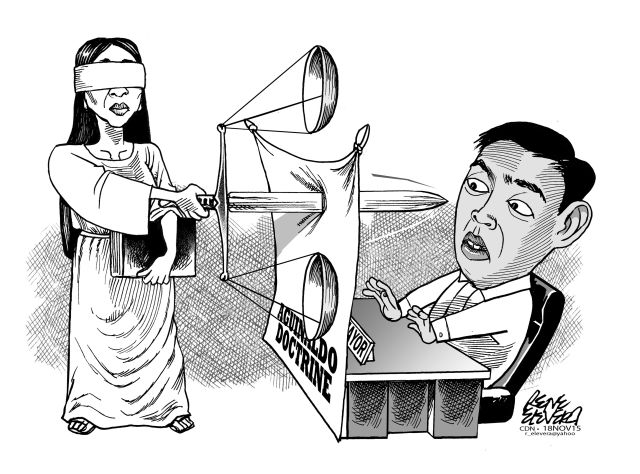
The recent Supreme Court ruling that upheld the Court of Appeals’ decision to impose a temporary restraining order (TRO) on the Ombudsman’s suspension of former Makati City mayor Jejomar Erwin “Junjun” Binay Jr. was a double-edged sword for both Binay and local elected officials across the country.
On one hand, the High Tribunal ruled that condonation in the Aguinaldo doctrine, which allows elected officials to stay in power despite administrative charges filed against them on the grounds that their reelection is a public condonation of past offenses, was still in effect when the CA ruled on granting Binay’s TRO.
On the other hand, the condonation doctrine doesn’t allow Binay to return to his post after the Ombudsman dismissed him from service on graft charges in relation to the alleged overpriced construction of the Makati City Hall parking building 2.
Given all that, the public would be quite skeptical of the Ombudsman finally cracking down and dismissing errant officials.
But Ombudsman Conchita Carpio-Morales wasn’t finished with Binay yet.
Recently, she ordered the dismissal of incumbent Cagayan de Oro City Mayor Oscar Moreno, a Liberal Party (LP) ally, as well as other officials allied with the administration.
But again, thanks to the Supreme Court, the Ombudsman isn’t all that powerful. Again in upholding the CA ruling on Binay’s case, the tribunal said the Ombudsman’s investigation and decision can be questioned in courts other than the SC.
While elective national and local officials can take comfort in the ruling, it may also further complicate political disputes. Still the SC decision may finally give those with substantial cases against errant incumbent officials some cause to pursue their complaint without being hobbled by the Aguinaldo doctrine.
For far too long, the doctrine had been used fairly or unfairly depending on one’s political affiliation as a blanket by officials charged with corruption and other offenses to protect themselves from prosecution.
We have yet to see whether the aggressive prosecution mode of Morales will yield fruit and cause public officials to become honest and hold themselves accountable. So far, it is producing results.
In this regard, the SC and the country’s justice system is finally responding to the public clamor to make elective and appointed officials be a little more honest, a little upright in their actions and decisions.
And we can thank God for small mercies that somehow, something is being done to establish a culture of accountability, responsibility and transparency in government.